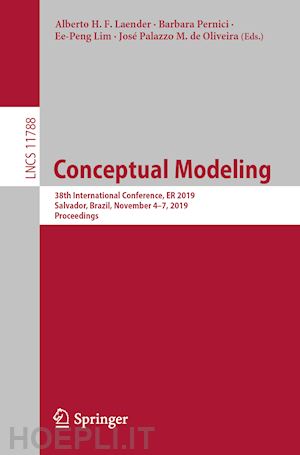
Questo prodotto usufruisce delle SPEDIZIONI GRATIS
selezionando l'opzione Corriere Veloce in fase di ordine.
Pagabile anche con Carta della cultura giovani e del merito, 18App Bonus Cultura e Carta del Docente
The 22 full and 22 short papers presented together with 4 keynotes were carefully reviewed and selected from 142 submissions.
This events covers a wide range of topics, covered in the following sessions: conceptual modeling, big data technology I, process modeling and analysis, query approaches, big data technology II, domain specific models I, domain specific models II, decision making, complex systems modeling, model unification, big data technology III, and requirements modeling.Invited Talks.- Data Management in the Era of Digitalization.- Keyword Search over RDF Datasets.- Next Generation Modeling Environments.- State of Permissionless and Permissioned Blockchains: Myths and Reality.- Session 1. Conceptual Modeling.- OOC-O: a Reference Ontology on Object-Oriented Code.- Relations in Ontology-Driven Conceptual Modeling.- Capturing Multi-Level Models in a Two-Level Formal Modeling Technique.- An SQLo front-end for Non-Monotonic Inheritance and De-referencing.- Session 2. Big data technology I.- Modeling Data Lakes with Data Vault: Practical Experiences, Assessment, and Lessons Learned.- Requirements-Driven Visualizations for Big Data Analytics: a Model-Driven approach.- Don’t Tune Twice: Reusing Tuning Setups for SQL-on-Hadoop Queries.- A Graph Model for Taxi Ride Sharing supported by Graph Databases.- Session 3. Process modeling and analysis.- Comprehensive Process Drift Detection with Visual Analytics.- A Probabilistic Approach to Event-Case Correlation for Process Mining.- DCR-KiPN: a Hybrid Modeling Approach for Knowledge-intensive Processes.- Exploring the Modeling of Declarative Processes Using a Hybrid Approach.- Session 4. Query approaches.- Negation in Keyword Search over Relational Databases.- Answering GPSJ Queries in a Polystore: a Dataspace-Based Approach.- Ontology-Schema Based Query by Example.- Query Rewriting for Continuously Evolving NoSQL Databases.- Session 5. Big data technology II.- Relaxed Functional Dependency Discovery in Heterogeneous Data Lakes.- An ontological perspective for database tuning heuristics.- SkipSJoin: A New Physical Design for Distributed Big Data Warehouses in Hadoop.- Learning k-Occurrence Regular Expressions from Positive and Negative Samples.- Session 6. Domain speci?c models I.- What Rocks Are Made of: Towards an Ontological Pattern for Material Constitution in the Geological Domain.- Role-Based Clustering for Collaborative Recommendations in Crowdsourcing System.- A Reference Conceptual Model for Virtual Network Function Online Marketplaces.- Intuitive Understanding of Domain-speci?c Modeling Languages: Proposition and Application of an Evaluation Technique.- Session 7. Domain speci?c models II.- A Unifying Model of Legal Smart Contracts.- Formal Speci?cation of Environmental Aspects of a Railway Interlocking System Based on a Conceptual Model.- From a Conceptual Model to a Knowledge Graph for Genomic Datasets.- Session 8. Decision making.- Decision-making in Knowledge-intensive Processes: The Case of Value Ascription and Goal Processing.- Conceptualization, Design, and Implementation of EconBPC – A Software Artifact for the Economic Analysis of Business Process Compliance.- DEMOS: a participatory design approach for democratic empowerment of IS users.- Session 9. Complex Systems Modeling.- Finding Preferred Objects with Taxonomies.- Generic negative scenarios for the speci?cation of collaborative cyber-physical systems.- Session 10. Model uni?cation.- HIKE: A Step Beyond Data Exchange.- Uni?ed Management of Multi-Model Data.- Schema Validation and Evolution for Graph Databases.- Grounding for an Enterprise Computing Nomenclature Ontology.- Session 11. Big data technology III.- Events as Entities in Ontology-Driven Conceptual Modeling.- Parallel Clique-like Subgraph Counting and Listing.- Modal Schema Graphs for Graph Databases.- A Systematic Approach to Generate Diverse Instantiations for Conceptual Schemas.- Session 12. Requirements modeling.- Factors a?ecting comprehension of contribution links in goal models: an experiment.- iStar-p: A Modelling Language for Requirements Prioritization.- On the Use of Requirement Patterns to Analyse Request for Proposal Documents.- iStar4RationalAgents: Modeling Requirements of Multi-Agent Systems with Rational Agents.











Il sito utilizza cookie ed altri strumenti di tracciamento che raccolgono informazioni dal dispositivo dell’utente. Oltre ai cookie tecnici ed analitici aggregati, strettamente necessari per il funzionamento di questo sito web, previo consenso dell’utente possono essere installati cookie di profilazione e marketing e cookie dei social media. Cliccando su “Accetto tutti i cookie” saranno attivate tutte le categorie di cookie. Per accettare solo deterninate categorie di cookie, cliccare invece su “Impostazioni cookie”. Chiudendo il banner o continuando a navigare saranno installati solo cookie tecnici. Per maggiori dettagli, consultare la Cookie Policy.